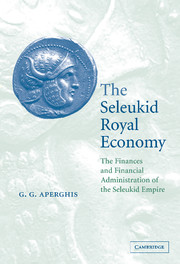Book contents
- Frontmatter
- Contents
- List of figures
- List of tables
- Preface
- List of abbreviations
- Map. The Hellenistic Near East
- Introduction
- Part I PRELIMINARIES
- Part II THE UNDERLYING ECONOMY
- Part III THE ROYAL ECONOMY
- Chapter 7 PS.-Aristotle's Oikonomika, Book 2
- Chapter 8 Revenue
- Chapter 9 The handling of surpluses
- Chapter 10 Expenditure
- Chapter 11 Coinage
- Chapter 12 A model of the Seleukid economy
- Chapter 13 Financial administration
- General conclusions
- Appendix I Coin hoards lists
- Appendix 2 Documents and translations
- References
- Index
Chapter 13 - Financial administration
from Part III - THE ROYAL ECONOMY
Published online by Cambridge University Press: 22 September 2009
- Frontmatter
- Contents
- List of figures
- List of tables
- Preface
- List of abbreviations
- Map. The Hellenistic Near East
- Introduction
- Part I PRELIMINARIES
- Part II THE UNDERLYING ECONOMY
- Part III THE ROYAL ECONOMY
- Chapter 7 PS.-Aristotle's Oikonomika, Book 2
- Chapter 8 Revenue
- Chapter 9 The handling of surpluses
- Chapter 10 Expenditure
- Chapter 11 Coinage
- Chapter 12 A model of the Seleukid economy
- Chapter 13 Financial administration
- General conclusions
- Appendix I Coin hoards lists
- Appendix 2 Documents and translations
- References
- Index
Summary
In previous chapters a case was made for a Seleukid royal economy whose different elements – the foundation and support of cities, the policy concerning royal land and its produce, the system of tribute and taxation, and the manner in which coinage was used – were planned in such a way so as to ensure for the kings an increase in their revenue, primarily that in silver. What was required was an efficient system to collect this revenue.
In this chapter the rather limited evidence is examined in an attempt to produce an outline and assessment of the Seleukid system of financial administration.
To begin with, it will be necessary to review what one knows of the Achaemenid system and any changes introduced by Alexander. Administrative practices throughout history have been relatively insensitive to political change, as new masters are reluctant to replace something that works well, as long as they continue to benefit, just as their predecessors did before them. In principle, therefore, one would expect some continuity from the Achaemenids to the Seleukids (and, indeed, the Ptolemies), since the underlying problems of empire remained essentially the same and the method of administration had proved itself over two centuries. While this is likely to be true, it has been more of an assumption than a proven fact.
Fortunately one can make use of a so far underutilized source, the Persepolis Fortification Texts (ch. 1.4b), which provide many details of Achaemenid administration.
- Type
- Chapter
- Information
- The Seleukid Royal EconomyThe Finances and Financial Administration of the Seleukid Empire, pp. 263 - 296Publisher: Cambridge University PressPrint publication year: 2004



